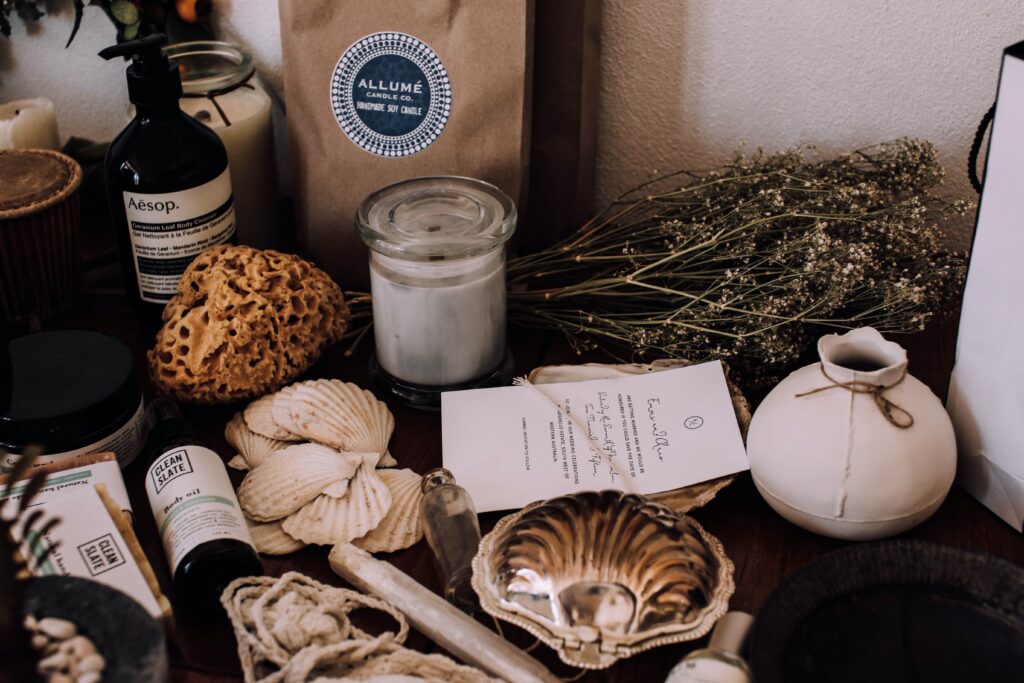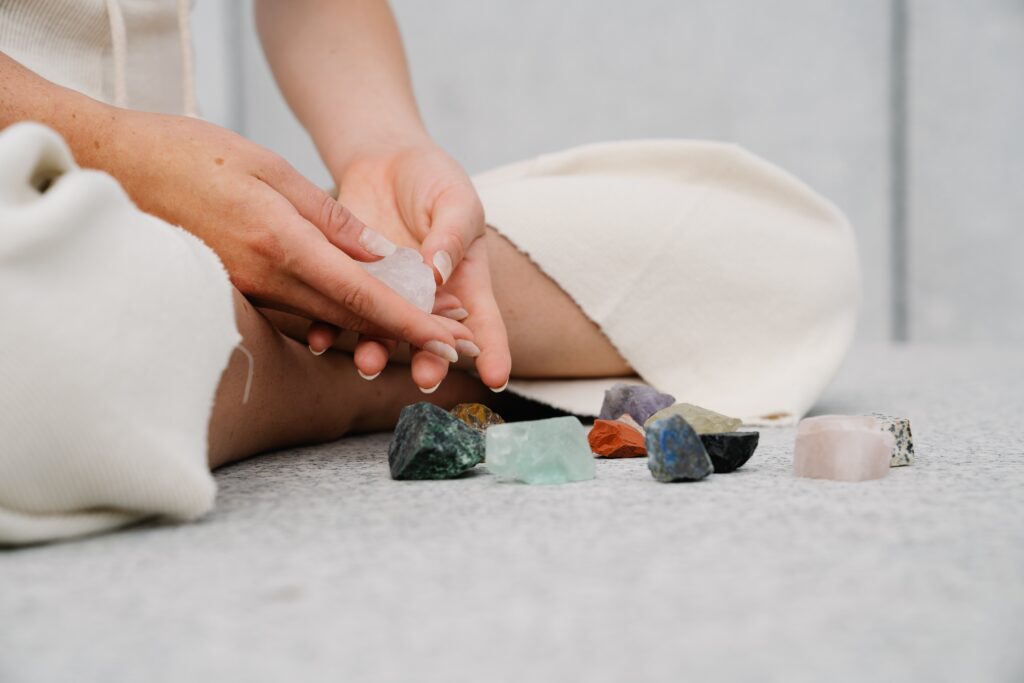Creating the perfect self-care toolkit and nurturing your well-being might just be easier than you had imagined. There’s an art of sorts to creating the perfect self-care toolkit to support your overall emotional and mental well-being. We know self-care is essential for managing stress, enhancing mental wellness, and finding balance in our fast-paced lives. The perfect self care toolkit is a great way to go deeper with self-discovery and self-nurturing.

Table of Contents
Understanding Self-Care
What does self-care entail? Self-care is the intentional practice of taking care of ourselves physically, mentally, emotionally, and socially. It plays a vital role in maintaining a healthy and fulfilling life. So by prioritizing self-care, we can recharge, rejuvenate, and thrive. Let’s explore how to create a self-care toolkit tailored to your needs.
Assessing Your Needs
To begin, take a moment for self-reflection. Assess your needs and identify areas in your life that require attention. Each person’s self-care requirements are unique. Ask yourself: What areas of my life need more attention and care? Is it physical health, mental well-being, emotional balance, or social connections? Understanding your specific needs will guide you in building an effective self-care toolkit.
Identifying Key Elements
Building a comprehensive self-care toolkit involves nurturing different aspects of your being. Let’s explore the key elements to consider:
Physical Self-Care
Physical self-care is the foundation of overall well-being. Regular exercise, proper nutrition, adequate sleep, and relaxation techniques are crucial. Engage in activities that boost your physical health, such as yoga, brisk walks, or dancing. Remember, caring for your body is an act of self-love.
Mental Self-Care
Nurturing your mental well-being is equally important. Incorporate practices that promote mental clarity, focus, and emotional resilience. Consider activities like mindfulness meditation, journaling, engaging in hobbies, or positive affirmations. These practices can help calm your mind and enhance self-awareness.
Emotional Self-Care
Emotional self-care involves acknowledging, understanding, and managing your emotions. Create space for self-compassion, allow yourself to feel, and seek support when needed. Engage in activities that uplift your spirits, such as listening to music, painting, or spending time in nature. Remember, your emotions are valid, and caring for them is an act of self-compassion.
Social Self-Care
Nurturing social connections is essential for our well-being. Set aside time for meaningful interactions with loved ones, friends, or support groups. Foster relationships that uplift and support you. Establish healthy boundaries, prioritize quality time, and be open to new connections. Remember, we are social beings, and human connection brings joy and fulfillment.



Building Your Self-Care Toolkit
Now that we’ve explored the key elements of self-care, it’s time to build your personalized self-care toolkit. Here’s how:
Assessing Your Resources
Take stock of the resources available to you. Consider factors like time, finances, and accessibility to specific activities or tools. Your self-care toolkit should align with your circumstances and be feasible to maintain. Assess what you have at your disposal and embrace the opportunities within your reach.
Selecting Activities and Practices
Create a menu of self-care activities and practices that resonate with you. Choose activities that align with your preferences and bring you joy. Whether it’s a soothing bath, reading a book, practicing gratitude, or trying out a new hobby, ensure your toolkit reflects your unique needs and interests.
Scheduling and Prioritizing
Integrate self-care into your daily routine by scheduling dedicated time for it. Treat self-care as a non-negotiable appointment with yourself. Prioritize your well-being and commit to regular self-care practices. Remember, self-care is not selfish; it’s essential for your overall health and happiness.
Troubleshooting Challenges
Challenges may arise on your self-care journey. Time constraints, lack of motivation, or self-imposed guilt can hinder progress. When facing obstacles, remember to be gentle with yourself. Seek support, modify your approach, or adjust your expectations. Adaptability and resilience are key to maintaining a sustainable self-care routine.
Reaping the Benefits
By nurturing yourself through a well-crafted self-care toolkit, you can reap numerous benefits. Improved well-being, reduced stress levels, enhanced relationships, and increased productivity are just a few of the positive outcomes. Embrace self-care as a lifelong practice, and let it blossom your awesome!
Conclusion
Creating the perfect self-care toolkit is a powerful way to self-discovery and self-nurturing. By incorporating physical, mental, emotional, and social aspects into your toolkit, you can cultivate a well-rounded approach to self-care. Remember to customize your toolkit to fit your unique needs, assess your resources, and prioritize your well-being. Embrace self-care as an essential part of your life, and let it empower you to blossom your awesome!
Be sure to checkout these other self-care posts –
- Mastering Self-Care: A Holistic Approach
- 5 Self-Care Goals You Need To Try
- 9 Powerful Ways to Work on Yourself

A Great Resource For Those Seeking Extra Support On Their Self-Care Journey
If you’re interested in learning more about online therapy, I recommend checking out BetterHelp. They offer online therapy sessions with licensed therapists at an affordable price point.
As you know I’m a huge proponent of mental wellness and ensuring we all get the help we need when we need it. And of course, I don’t want you just to get any help I want you to get the right help so I am now sponsored by BetterHelp.
BetterHelp is the world’s largest therapy service, and it’s 100% online.
BetterHelp offers a network of over 25,000 licensed and experienced therapists who can help you with a wide range of issues.
Just click on the link below, answer a few questions and get matched with a therapist from the network.
One of the most amazing features of BetterHelp, if you don’t jive with your therapist you can switch to a new one that’s a better fit for you any time free of charge.
With BetterHelp, you get the same professionalism and quality you expect from in-office therapy, but with a therapist who is custom-picked for you, more scheduling flexibility, and at a more affordable price.
FAQs
Self-care is a topic that sparks curiosity and raises important questions. In this FAQ sections let’s consider some of the most common questions about self-care and provide insightful answers to help you navigate your self-care journey.
Q1: What are a few good book titles on self-care?
A: Reading books on self-care can offer valuable insights and inspiration on your wellness journey. Here are three highly recommended book titles to explore:
- The Self-Care Solution: A Modern Mother’s Essential Guide to Health and Well-Being by Julie Burton: This book offers practical tips and guidance specifically targeted at busy mothers, but its wisdom applies to anyone seeking to prioritize self-care in their lives.
- The Gifts of Imperfection: Let Go of Who You Think You’re Supposed to Be and Embrace Who You Are by Brené Brown: Dr. Brené Brown dives into the power of vulnerability and self-acceptance, guiding readers towards embracing their true selves and nurturing their well-being.
- The Little Book of Self-Care by Mel Noakes: This pocket-sized book is a treasure trove of simple and accessible self-care practices. From mindfulness exercises to self-compassion techniques, it offers practical suggestions for enhancing your self-care routine.
Remember, there are numerous excellent books available, so explore different genres and authors to find the ones that resonate with you.
Q2: Are there scientifically proven benefits to self-care?
A: Absolutely! Research has shown that practicing self-care brings a multitude of benefits to our overall well-being. Here are some scientifically proven benefits:
- Reduced stress levels: Engaging in self-care activities like meditation, exercise, and relaxation techniques has been found to lower stress hormone levels, promoting a sense of calm and relaxation.
- Improved mental health: Regular self-care practices, such as mindfulness and journaling, have been associated with decreased symptoms of anxiety and depression, improved mood, and increased emotional resilience.
- Enhanced physical health: Prioritizing self-care through activities like exercise, nutritious eating, and adequate sleep can boost physical health, strengthen the immune system, and improve overall energy levels.
- Better productivity and focus: Taking breaks and engaging in self-care activities can actually enhance productivity and concentration. By recharging your energy, you’ll be better equipped to tackle tasks and stay focused.
Remember, everyone’s experiences may vary, and self-care is a deeply personal journey. It’s essential to find practices that work best for you and align with your needs and preferences.
Q3: How can I learn to stick to my self-care routine?
A: Developing consistency in your self-care routine can be a challenge, but it’s certainly achievable. Here are some tips to help you stay committed:
- Start small: Begin by incorporating one or two self-care activities into your routine. Gradually increase the frequency or duration as you become more comfortable and confident.
- Set realistic goals: Be realistic about what you can accomplish within your current schedule and resources. Set achievable goals that are sustainable and manageable.
- Make it a priority: Treat self-care as an essential part of your day. Schedule it in your calendar, just as you would any other appointment, and honor that commitment to yourself.
- Find accountability: Share your self-care goals with a trusted friend or family member. Having someone who can hold you accountable and provide support can be highly beneficial.
- Be flexible and adaptable: Life is unpredictable, and circumstances may change. Be flexible with your routine and willing to adapt when necessary. It’s okay to modify your self-care practices to fit your current needs.
Remember, self-care is not an all-or-nothing endeavor. Celebrate your progress, be kind to yourself, and embrace the journey of self-nurturing.
Comments +
Creating The Perfect Self-Care Toolkit: Nurturing Your Well-Being
Self Improvement, Self Love